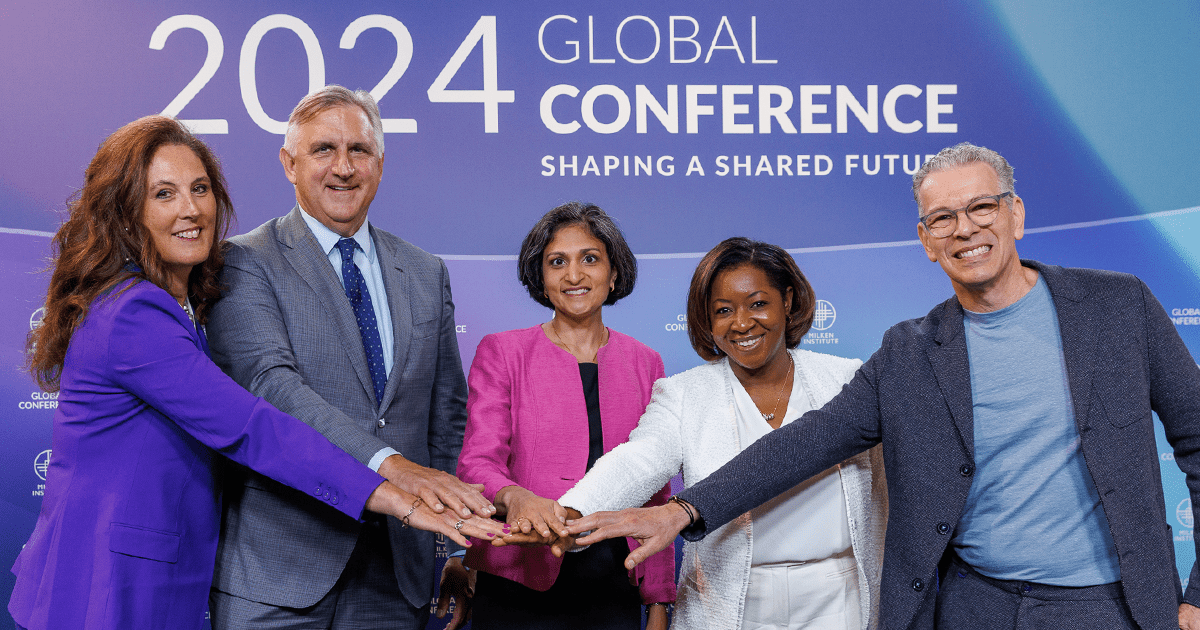
Speaking at the Milken Institute’s annual Global Conference, Amgen CEO Bob Bradway hailed dramatic advances in drug discovery made possible by the convergence of “biotech” and “tech,” but also warned of threats to the ecosystem in the U.S. that has long nurtured innovation.
Bradway participated in a panel discussion of “Prevention and Innovation for a Healthier Tomorrow,” along with Oracle Health Chairman David Feinberg, American Cancer Society CEO Karen Knudsen, U.S. Centers for Medicare and Medicaid Policy Deputy Administrator Meena Seshamani, and Milken Institute Executive Vice President for Health Esther Krofah. Other headline speakers at this year’s conference included tech entrepreneur Elon Musk, former U.S. President Bill Clinton, and Centers for Disease Control and Prevention Director Mandy Cohen.
Innovation to serve patients is at the heart of everything Amgen does, Bradway declared. “The staff of Amgen wake up every day hoping to make a difference for patients suffering from serious disease,” he added.
But creating a new medicine is only half the battle these days. “There’s nothing more frustrating,” Bradway said, “than having an innovation that successfully reduces the risk of – or even cures – a serious disease, and then discovering that the therapy doesn’t get to the patients who can benefit from it most. We spend a lot of time working through what’s preventing people from getting the therapies they need.”
To ensure that patients continue benefiting from new treatments, Bradway urged greater efforts to protect the U.S. policy ecosystem that encourages innovation. “This ecosystem does not exist all over the world,” he noted. “It has existed for some time in the U.S., but it’s at risk. As a society, we have to decide whether we want more innovation or not. If we do, we need to protect the elements of the ecosystem” – such as market-based pricing and strong intellectual property protection for new drugs – “that are required in order for biomedical innovation to flourish in this country.”
A central challenge is the administrative complexity of the way we finance and deliver healthcare in the U.S. While some spending on administration and other back-office functions is necessary and useful, a recent report in the journal Health Affairs found that at least half of total administrative spending is wasteful. By some estimates, that wasteful spending adds up to nearly $600 billion per year – representing as much as 15 percent of total U.S. healthcare spending.
Governments at all levels in the U.S. require healthcare providers to use antiquated information systems to comply with myriad rules and regulations, resulting in much needless complexity and cost. “We’ve created a system which is so complex that it’s imploding,” Bradway warned. “We either wait for that implosion to occur, or we have the courage to figure out a better way.”
One solution, he noted, would be “to create a more sane digital connection between patients and their healthcare data, so that the cost is more transparent and the processing is more automatic…. We’re missing one of the great opportunities available in the United States, which is the entrepreneurial ability to gather data, transact with data, make sense from data. And I think it’s tragic.”
Bradway noted that AI and other digital advances can help improve efficiency and overcome the “friction points” that can block patients from getting access to new innovations. “We’re excited to leverage digital information to ensure we’re getting the right healthcare to the right place for the right patients,” he said, adding that “we’re in a period that’s ripe with the opportunity to tell patients who’ve lived believing that there are no good therapies available for them, that this has changed and that there are now therapies available.”
